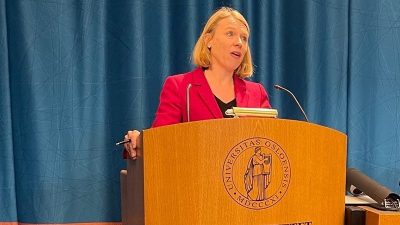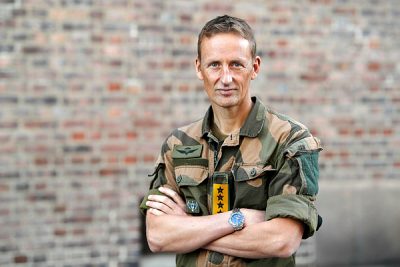Norway’s foreign- and defense ministers joined US and NATO allies on Tuesday in warning of an imminent Russian invasion of Ukraine, and announced that more Norwegian troops were being sent to Lithuania. Norwegian officials also warn that even if Russia withdraws its troops around Ukraine, threats of potential cyber attacks and increased military presence in both the Arctic and the Baltic will continue to loom.

Tensions remain at their highest level in decades, with Norwegian Foreign Minister Anniken Huitfeldt now joining US and other NATO allies in claiming that an invasion can occur at any time. The Norwegian government has earlier taken a more conciliatory approach, stressing how Norway has managed to peacefully co-exist with its Russian neighbour in the Far North for centuries, and how important it is to maintain dialogue.
Now Huitfeldt is claiming that “Russia so far has not shown willingness to engage in real negotiations.” She confirmed that diplomatic conversations continue (Germany’s new chancellor was meeting with Russian President Vladimir Putin in Moscow on Tuesday), and NATO chief Jens Stoltenberg later said he was “cautiously optimistic” Russia would continue to engage in diplomacy. Norway, however, is continuing to beef up its own defense and sending more soldiers to join NATO troops in Lithuania, which also shares a border with both Russia and its ally, Belarus.
‘Extremely demanding security situation’
Huitfeldt’s comments came during an impromptu press briefing at the Norwegian Parliament, where she was joined by Defense Minister Odd-Roger Enoksen. The foreign ministry also released a statement Tuesday morning noting that Parliament “had been consulted” on the government’s decision to increase its contribution to NATO defense forces along or near the Russian border. Around 60 more soldiers will be sent to NATO’s so-called “enhanced Forward Presence (eFP)” in Lithuania, adding to Norwegian troops already in the Baltic region where Russia also has been unusually active of late.

“We are in an extremely demanding security situation in Europe,” Enoksen stated, adding that “the massive Russian build-up around Ukraine and the demands from the US and Europe have changed the security situation. That also affects Norway, and we’re following the situation closely.”
It was only a few weeks ago that Enoksen, who represents the Center Party, was calling on NATO to continue to refer to Russia as a “partner” instead of an adversary. He told Parliament in January that he thought it would be “unwise” for NATO to remove Russia as a “strategic partner” from NATO’s “strategic concept” from 2010. He claimed Norway and NATO stood to gain from having “a good dialogue” with Russia. “It’s a long-term goal to maintain both dialogue, partnership and the best possible cooperation with Russia.”
News bureau NTB reported at the time that other Members of Parliament, including Christian Tybring-Gjedde of the conservative Progress Party, also claimed that Norway should show more understanding for Russia’s situation. “They feel abandoned and surrounded” by NATO now, Tybring-Gjedde said. Others weren’t so sure, with the defense policy spokesman for the Conservative Party, Hårek Elvenes, claiming that everything changed when Russia annexed Ukraine’s Crimean Peninsula in 2014.
Now Norway clearly is asserting itself more as a loyal NATO member than a friendly neighbour of Russia, even though Prime Minister Jonas Gahr Støre of the Labour Party has stressed Norway’s success with its “good neighbour policy” in recent meetings with both US President Joe Biden and French President Emmanuel Macron. On Tuesday, Støre’s foreign minister Huitfeldt, also from the Labour Party, was stressing that “Norway has a long coast and is NATO’s eyes and ears in the North. That’s our most important assignment.” It’s now also important, she said, “to demonstrate our allied relations with our contribution here.”

Enoksen followed up by noting how Norway serves as NATO’s northern flank and “contributes every day” with its understanding of the situation, preparedness and constant presence in the Arctic where Russian military activity has also picked up. Norway will also once again be hosting the annual NATO winter exercises called Cold Response that begin later this month.
Norway has already been sending out some of its new F35 fighter jets to respond to Russian jets buzzing Norwegian air space. Newspaper Klassekampen has reported how the current conflict with Russia has prompted big changes at the newly expanded Evenes air station between Harstad and Narvik, where also US forces will have a much larger if controversial presence. Norway has boosted its own surveillance and cyber defense and one of its frigates is sailing with a US aircraft carrier in the Mediterranean.
It indicates how tensions with Russia had been rising long before Putin ordered troops to the Ukainian border. Many Norwegian defense experts still don’t think Putin will actually invade Ukraine now, however, because of the huge costs and casualties that would involve.
Cyber threat ongoing
Norwegian Defense Chief Eirik Kristoffersen also stressed Russia’s risks with an invasion, both humanitarian and economic, since Russia would lose its biggest gas customers in Europe. He told newspaper Aftenposten recently that the last few months have at least shown that military power can be used to force diplomacy or to attack. He also cited potential cyber attacks, which Norway’s military intelligence agency E-tjenesten ranked last week as the biggest threats posed now by both Russia and China.
Rear Admiral Nils Andreas Stensønes, head of E-tjenesten, reported that cyber operations from Russia and China have become more advanced, better synchronized and coordinated, “and that’s worrisome.” Norway has already been attacked on several occasions in operations on behalf of Russia and China, claim both E-tjenesten and the Norwegian police intelligence service PST. The national security authority NSM reports a tripling of serious cyber attacks against both the public and private sector in Norway with the Parliament and companies like hotel firm Nordic Choice, media conglomerate Amedia, meat producer Nortura and several regional governments.

The threat of more such attacks will continue, the experts claim, regardless of whether Russia invades Ukraine. Norway’s banking and finance industry was working hard this week to boost its own cyber security in the event of an attack aimed at disrupting the banking system.
Some think the US, other NATO allies and now Norway have been trying to call Russia’s bluff with all their statements about an imminent attack. It could either force Putin to act or retreat, with the Russians stressing this week that their troop buildup has merely been part of military exercises and they’d never intended to attack. That could help them save face if they retreat. Kristoffersen is among those questioning what Russia would really achieve with an actual attack.
Støre still pushes for discussions
Prime Minister Støre said after his meeting with French President Macron on Friday that the two agree that “political discussions and negotiations must be the way to go.” Macron has met with Putin amid debate over just how unified the NATO alliance really is. Veteran diplomat and former UN envoy Kai Eide is among those who don’t think NATO is unified behind its promises to Ukraine. He told newspaper Klassekampen that any enticement of NATO membership for Ukraine would be “careless in a dangerous situation.” While the US may want Ukraine in NATO, Germany does not, and other NATO members could see an invitation to Ukraine as a provocation against Russia.
Norway, meanwhile, remains caught in the middle between trying to be a good NATO- and US ally while not wanting to provoke Russia either. On Tuesday, the government was clearly boosting its commitment to NATO, though. “Norway has close contact with its allies and partners in this demanding situation and we are very satisfied that NATO is showing strong allied solidarity,” Huitfeldt said. Norway, however, has no intention of offering to send Norwegian troops to Ukraine if Russia were to invade: “We’re not doing anything to support Ukraine militarily. Ukraine is not a member of NATO so that’s not on the agenda.”
newsinenglish.no/Nina Berglund

